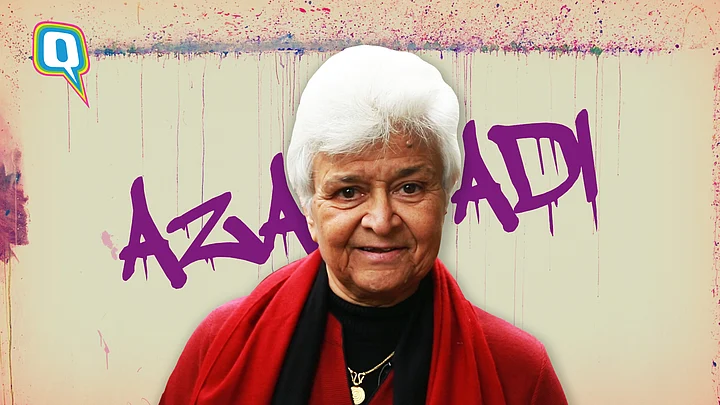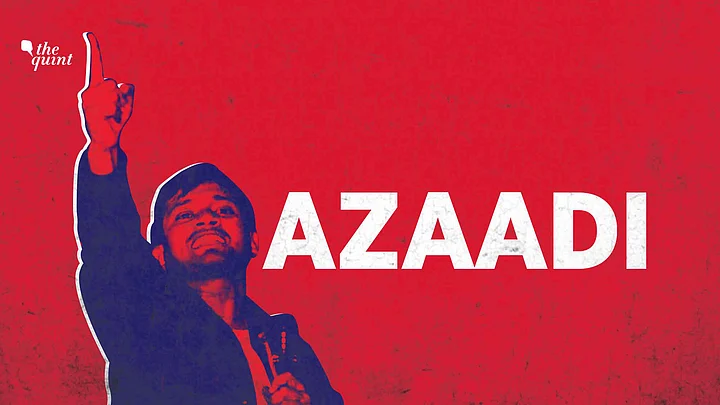Eminent feminist, women's rights activist, poet, author and social scientist Kamla Bhasin breathed her last on Saturday, 25 September. She was 75. Bhasin had reportedly been diagnosed with cancer a few months ago.
Kamla, an outspoken champion of women's rights in India and South Asia since the 1970s, was best known for her work with Sangat: A Feminist Network and her poem Kyunki main ladki hoon, mujhe padhna hai.
Born in Shahidanwaali village in the Gujrat district of Punjab – now in Pakistan – in 1946, a year before the partition, Kamla referred to herself as one of the 'midnight generation'. After completing her graduation and post-graduation from Rajasthan, she won a fellowship to study 'sociology of development' at the University of Münster in West Germany.
Upon returning, she started working at the Seva Mandir in Rajasthan, where she met her future husband, the late journalist and activist Baljit Malik.
She always said that feminism was not a war between men and women but a war against the ideology of patriarchy, ie a clash of two ideologies.
"One that elevates men and gives them power, and the other, that advocates for equality!" she had told the Hindustan Times.
Bhasin brought the 'Azaadi' chant to India, which Pakistani feminists first used to protest against the Zia-ul-Haq regime.
In February 2019, Bhasin had told The Quint that she had first heard the chant for 'azaadi' in 1984 among feminists in Pakistan, who were vocal against the regime of Zia-ul-Haq. "35-years-ago, I went to Pakistan. Pakistan at that time was ruled by Zia-ul-Haq. The first group that rose up against Zia-ul-Haq was not a political party, it was a group of Pakistani feminists. I witnessed one such meeting, and that's where they chanted it.
The chant went:
“Aurat ka naara - azaadi,
Bachchon ka naara - azaadi,
Hum leke rahenge - azaadi,
Hai pyara naara - azaadi”
After a four-year stint working with the United Nations Food and Agricultural Organisation in Bangkok from 1975, Bhasin returned to India where she played an important role in the women's movement that arose after the horrific Mathura rape case, where two policemen raped a Dalit woman in a police station. The movement led to significant changes in the law on rape in India.
She would continue to work with the UN till 2002.
Bhasin authored a number of ground-breaking books in the South Asian feminist movement, including Understanding Gender, What is Patriarchy, and Borders and Boundaries: How Women Experienced the Partition of India (the latter with Ritu Menon).
Her work explored how patriarchy had fostered discrimination against women from historical times, rather than innate differences between men and women, and that this had taken on newer cultural forms – for instance through pornography – rather than being limited to religious and traditional strictures.
While Bhasin long spoke about the need to ensure the feminist movement in India included Dalit voices, in May 2021 she found herself at the heart of a controversy by saying feminism was all about gender and isn't an issue about race, caste, trans issues or ecology, as has been argued by intersectional feminists in recent times.
She apologised for her remarks after it was pointed out that her view of gender here was not the most inclusive.
Bhasin was married to activist and journalist Malik for around three decades but divorced him when he was physically violent to her. Her daughter Meeto passed away in 2006, but she is survived by her son Neet Kamal, who she lived with in New Delhi.
‘Rest in Power’, ‘End of an Era’; Twitter Pays Tribute to the Feminist Icon
After the news of her demise broke on Twitter, several fellow activists and public figures paid heart-felt tribute to the feminist stalwart and a comrade to many.
While many spoke of the personal experiences they shared with her, others tweeted about the monumental work Bhasin did in her life for feminism across South-Asia.
(With inputs from Hindustan Times)
(At The Quint, we question everything. Play an active role in shaping our journalism by becoming a member today.)


